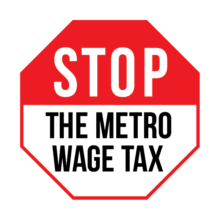Metro’s proposed transit tax needs better analysis before becoming law
Voters should reject Measure 26-218, which got to the ballot with little scrutiny and is riddled with uncertainties
By Senator Mark Hass
As the chair of the Oregon Senate Revenue Committee, I agree with the late U.S. Supreme Court Justice Oliver Wendell Holmes, who noted “taxes are what we pay for a civilized society.”
And I have a record of supporting light-rail transit.
But the Metro payroll tax now before voters has caught my eye. It’s a huge tax that evaded appropriate analysis and scrutiny.
Here’s why I think that: At the Legislature, we have the highly respected Legislative Revenue Office — about 10 economists who hold expertise in the technical and arcane world of tax policy.
These are the people who vet all revenue proposals, from tax cuts to tax increases and all the technical updates to existing law. They not only crunch numbers they provide research and tax incidence modeling, an enormously valuable tool for looking at how a tax proposal will impact Oregon’s economy.
Without their expertise, lawmakers would be stumbling in the dark on tax policies.
Example: The 2019 Student Success Act created a new business tax to help Oregon schools. Economists worked for two years on dozens of scenarios, showing us the puts and takes on each one. We used their modeling to set what we thought were fair rates with precise definitions.
Metro — like all local governments in Oregon — has no such office and lacks the technical capacity to rigorously vet these large multibillion-dollar revenue measures.
And it shows.
The accounting firm Moss Adams last month warned clients the Metro payroll tax may apply to employee health and retirement benefits. Metro immediately said that’s not the intent and promised to fix the language. But this is a glaring mistake that a seasoned economist would have spotted on the initial draft.
In addition, a University of Oregon economist questioned the number of jobs the measure would create as “misleading.” Whether this was campaign fudging or an actual error, Metro would have been better served to show how their own economists arrived at this number.
There’s no doubt public works projects create construction jobs — and that’s an important consideration. But economic modeling shows that with all large tax increases, there also will be indirect job losses elsewhere. Policymakers need to understand this trade-off and look at both numbers, not just the one that is most attractive.
One of the cornerstones of sound tax policy is the canon of certainty. Taxpayers should know exactly how a tax will work and what they’re getting in exchange. Unfortunately, there is uncertainty with Measure 26-218. While the language appears to say the law is permanent, Metro officials now say it may be temporary. A permanent tax for temporary spending can undermine taxpayer trust.
And, while the language states that the tax cannot exceed 0.75% of wages, Metro officials now say they will start with unspecified lower rates. What? Promising voters one thing before an election — and changing it after — will also undermine trust.
The complexity of state and local taxes and the sheer scope of administering them requires a great deal of expertise and work. If a tax is perceived to be unfair or hastily written, it just adds to the cynicism and misunderstanding about government.
I’m confident these transportation projects will go forward. My hope is that Metro will go back to the drawing board, this time with proper analysis and more people at the table to get this right.
State Sen. Mark Hass, D-Beaverton, chairs the Senate Finance and Revenue Committee. He can be reached at [email protected].
